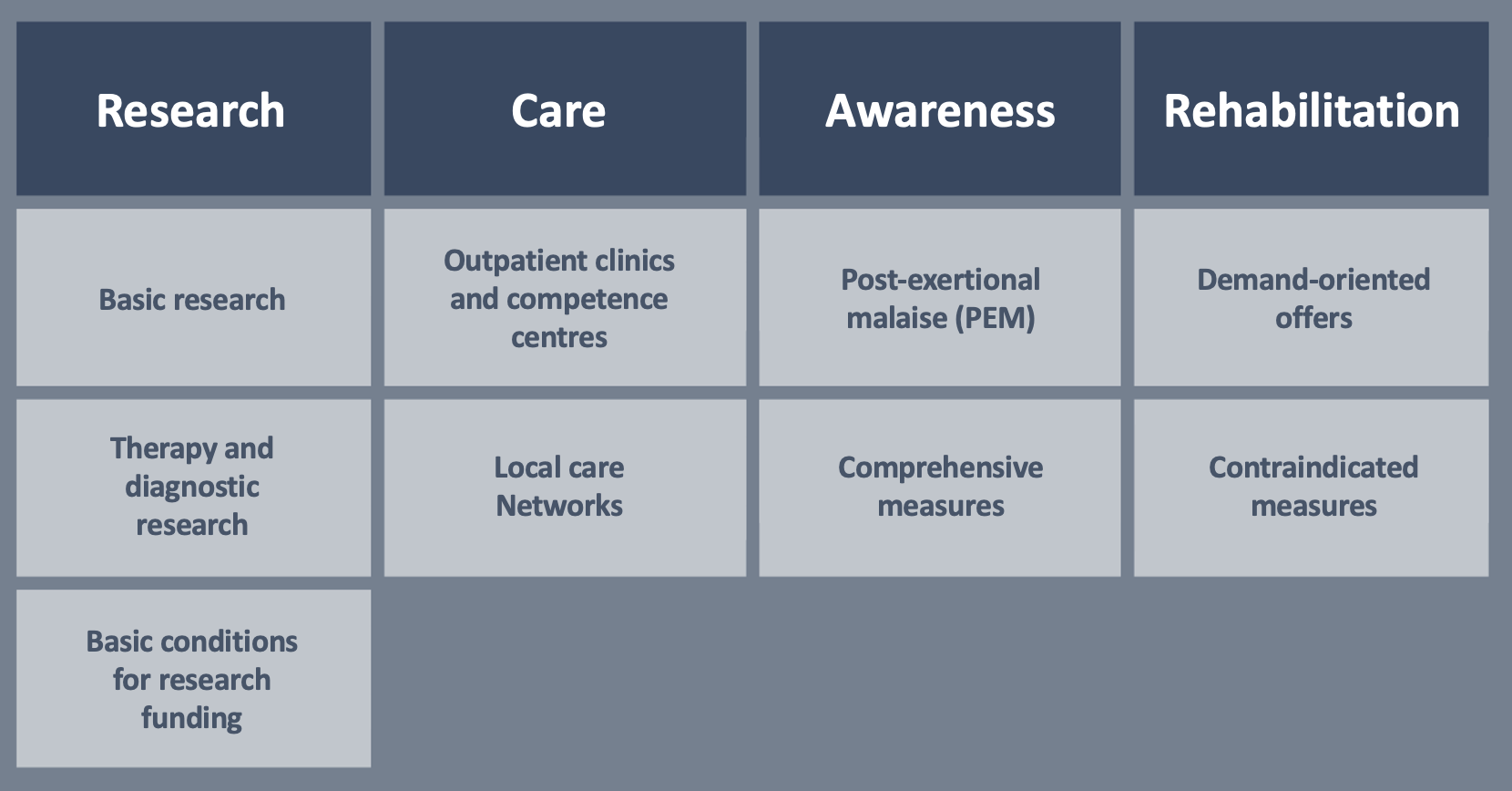The patient organisations German Association for ME/CFS (Deutsche Gesellschaft für ME/CFS) and Long COVID Germany publish a new guide for research, care, education and rehabilitation for ME/CFS and Post-COVID-Syndrome. The ME/CFS Research Foundation supports the priorities and criteria mentioned therein. These are recommended for an effective expansionof biomedical research into these diseases.
Berlin/Hamburg, 22 February 2023 - ME/CFS and Post-COVID-Syndrome currently present the greatest challenge in coping with the long-term consequences of the COVID-19 pandemic. ME/CFS, which also occurs after other infectious diseases, and Post-COVID-Syndrome in its various forms have not yet been adequately researched and cannot be causally treated. It is still unclear how often ME/CFS occurs after a SARS-CoV-2 infection, for a lack of population-representative studies on this subject to-date. Even before COVID-19, there were about 250,000 ME/CFS patients in Germany. This number is expected to double as a result of the ongoing pandemic.
Based on the current state of scientific and medical knowledge, the guideline describes focal points for biomedical basic, therapeutic and diagnostic research as well as for care, rehabilitation and education that need to be taken into account from the perspective of patient organisations. The document is aimed at politicians, the health care system and medical research in Germany. The guideline is intended to serve as an orientation for the creation of targeted funding guidelines at the level of state governments and within ongoing research and care projects as well as for the operation of specialised outpatient clinics.
Daniel Hattesohl, Chairman of the German ME/CFS Society, emphasises: "In the wake of the corona pandemic, there is a unique window of opportunity to conduct targeted research into ME/CFS and other post-infectious diseases and to develop causal therapies. In addition to similarities in the development of the diseases, there are also numerous overlaps in the care of ME/CFS and post-COVID-Syndrome sufferers. ME/CFS occurs after many infections, now also after COVID-19. The care of Post-COVID-Syndrome and ME/CFS must therefore be thought about and implemented together. Our guideline provides concrete starting points for this," Hattesohl continues.
The new guide covers the following topics:

Dr Claudia Ellert, spokesperson for patient organisation Long COVID Germany, points to the high funding needs for medical care. "Care is still inadequate in many places. There is a lack of staff and financial support. There is still no adequate remuneration for the high diagnostic and therapeutic effort in ME/CFS and Post-COVID-Syndrome." Furthermore, knowledge about the professional handling of post-infectious diseases urgently needs to be introduced in all relevant care institutions. "We need nationwide information campaigns. Starting with the health care system, to cost units, rehabilitation clinics and school and social welfare offices. Our guideline formulates clear requirements for action in this regard."
Joerg Heydecke, MD of the ME/CFS Research Foundation comments: "The coalition treaty of the Federal Government as of November 2021 pledged the setup of significant research and treatment resources for ME/CFS and Post-COVID-Syndrome. In February 2022, the patient organisations submitted an action plan for implementing these coalition goals to the federal government. These new guidelines further substantiate the recommendations for research and care in ME/CFS and PCS and specifically addresses the governments and responsible ministries of the federal states. All necessary preconditions for implementation in this area are thus also available to the state governments in a scientifically sound form. The task now is to expand projects already underway to include ME/CFS and to provide additional, necessary funding effectively and sustainably. In addition to the Federal Ministry of Education and Research (BMBF) for basic research and the Federal Ministry of Health (BMG) for health care research, the governments of the federal states are also called upon to promote the expansion of urgently needed biomedical research on ME/CFS. Comprehensive research into these diseases is urgently needed from a medical, social and economic point of view.
Our BIG THANK YOU for this important piece of work goes to the German Association for ME/CFS (Deutsche Gesellschaft für ME/CFS) and Long COVID Germany! The ME/CFS Research Foundation supports this new guideline. We will continue to shape and implement our commitment to biomedical research in ME/CFS and long/post-COVID in line with these recommendations".
Recommendations of the guideline towards RESEARCH:
Regarding Basic Research the guideline names and substantiates six concrete research approaches for parallel research into post-infectious disease patterns. These are particularly relevant in the context of newly established biomedical funding guidelines and should be prioritised in the allocation of public funds. The recommendations are based on current scientific findings, which are also substantiated in the guideline.
For research into therapies and diagnostics currently ongoing and planned research projects in Germany are described therein. For example, the National Clinical Study Group ME/CFS and Post-COVID-Syndrome (NKSG CFS/PCS) and its connection to the National Pandemic Cohort Network (NAPKON) are explained. The research projects at the University Hospital Erlangen or the joint project IMMME (IMune Mechanisms of ME) are mentioned including their objectives. Recommendations include the establishment of further research centres in close scientific connection to these initiatives. The study protocols, diagnostic procedures and biomarker and diagnostic platforms established by the NKSG CFS/PCS study group should also be used by future research projects.
As a Framework conditions for research funding the document outlines specific criteria for the selection of research projects to be funded. These include existing biomedical research experience on ME/CFS and/or Post-COVID-Syndrome, local/regional access to existing ME/CFS and/or Post-COVID-Syndrome patient cohorts and secure access to Post-COVID-Syndrome biodata, e.g. via NUM/NAPKON and/or the German ME/CFS biodatabase. Furthermore, national and international standards and measures for quality assurance of the planned research projects are recommended for the allocation of funds (WMA Declaration of Helsinki, etc.). Additional disease-specific criteria are specified and their consideration is recommended.
Detailed requirements and recommendations are also defined and explained for the areas of care, education and rehabilitation.
The new guideline is being supported by ME/CFS Research Foundation and Lost Voices Foundation (Lost Voices Stiftung) , as well as patient organisations Fatigatio e.V. - Federal Association ME/CFS and POTS und andere Dysautonomien e.V.
Download the guide (German version only - English version to be provided as soon as possible): www.longcoviddeutschland.org/leitfaden
Furthermore, new educational videos provided by German Association for ME/CFS (Deutsche Gesellschaft für ME/CFS) and Long Covid Germany (Long Covid Deutschland) outline valuable explanations and recommendations to players within the health and social care system, as well as patients and their relatives. The videos explain the typical deterioration of patient’s available energy after physical or cognitive stress (post-exertional malaise, PEM for short) and the correct handling of individual stress limits ("pacing").
Educational videos on Youtube (German language only): www.youtube.com/@mecfsundlongcoviderklaert
About the organisations involved and/or mentioned in the guidelines:
The German Society for ME/CFS (Deutsche Gesellschaft für ME/CFS e.V.) is an organisation founded in 2016 to advocate for the rights and needs of ME/CFS patients. To this end, it combines the important expertise of patients and relatives with the expertise of an experienced medical advisory board.
Homepage: www.mecfs.de/
Long COVID Germany is a private and voluntary association of Long COVID patients and their relatives. As an initiative, LCD advocates for education, care and research into the long-term effects of COVID-19. Since May 2020, Long Covid Germany has been running an online support group. www.longcoviddeutschland.org/
The ME/CFS Research Foundation was founded in 2022 to initiate and fund biomedical research on ME/CFS. The focus of the foundation is on funding basic and therapeutic/drug research. http://www.mecfs-research.org/
Der Fatigatio e.V. - Federal Association ME/CFS has been supporting its members in German-speaking countries on a voluntary basis since 1993 as the largest ME/CFS patient organisation. Self-help work, the commitment to care, research and education as well as a strong international network form the basis of the Federal ME/CFS Association. www.fatigatio.de/
The Lost Voices Foundation (Lost Voices Stiftung) represents the interests of ME/CFS patients in Germany. With a scholarship programme, it makes an important contribution to the ongoing underfunded research on ME/CFS in Germany. www.lost-voices-stiftung.org/
POTS und andere Dysautonomien e.V. started work in 2017 with the support of its medical advisory board to provide information about dysautonomias, especially POTS (postural tachycardia syndrome), and to accompany, promote and improve the situation of those affected, regardless of the cause. http://www.pots-dysautonomia.net/
How can you support the work of the ME/CFS Research Foundation?
There is still a long way to go before diagnosis, care and treatment of ME/CFS patients will one day become a medical and social standard. We at the ME/CFS Research Foundation are focussing on biomedical research, which we see as the key element in solving these problems (more on this in our research funding strategy). To do this, we need extensive support from private donors - patients, relatives, families, friends, associations, schools, networks, companies, initiatives, event organisers and all supporters. And if you can't support us directly, maybe you can share our story and motivate others to help. Because only together is such a feat possible.
We invest all donations and other kinds of support into scientifically excellent research, networking of researchers and ultimately visible results, i.e. better ME/CFS diagnostics and therapies. We are happy to work together with other organisations and initiatives - please contact us!
We appreciate all kinds of support!
Please subscribe to our newsletter:





